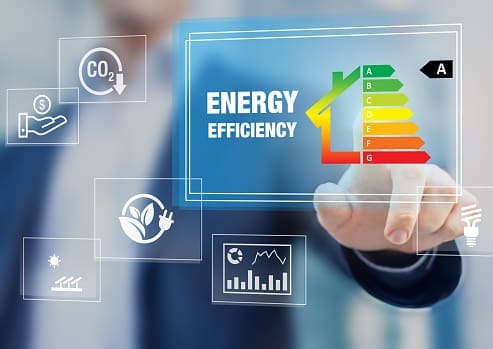What is a Good HERS Rating? A Guide for Florida Homeowners
Florida homeowners looking to improve their home energy efficiency ratings and the environmental impact often rely on the Home Energy Rating System (HERS) Index. This standardized system measures residential energy performance, helping homeowners understand how efficiently their home uses energy. In this blog post, we will explore what a good HERS rating is for homes and why it matters to you as a homeowner.
By: Christine Lam
Understanding the HERS Rating System
The HERS Index is an industry-standard rating system developed by the Residential Energy Services Network (RESNET) to assess the energy efficiency of homes. It compares a home’s energy performance to a reference home built to the 2006 International Energy Conservation Code (IECC).
The HERS Index is the industry benchmark, with scores ranging from 0 to 150. Lower scores indicate better efficiency:
- An index score of 70 means the home is 30% more energy-efficient than the reference home.
- An index score of 130 implies the home is 30% less energy efficient.
- A score of 0 represents a “net-zero energy” home that produces as much energy as it consumes.
Calculating a Home’s HERS Index
A home’s HERS Index rating is calculated by evaluating thermal performance, air leakage, and overall energy consumption. Several factors influence this score, including:
- Size and shape of the home.
- Insulation levels in walls, ceilings, and floors over unconditioned spaces like garages or cellars.
- Efficiency of HVAC systems.
- Performance of doors and windows.
- Air leakage and sealing.
- Energy consumption of lighting and appliances.
These variables included in an energy rating are analyzed using specialized energy modeling software and on-site inspections. The final score allows homeowners to anticipate the home’s energy efficiency is measured accurately and reliably.

Determining a Good HERS Rating for Florida Homes
While a HERS rating of 0 is the ideal scenario, achieving it may not be practical for all homes. However, a lower HERS rating generally translates to higher energy efficiency and lower utility bills. For Florida homeowners, aiming for a HERS rating below the state average of 58 is a reasonable goal.
Achieving this requires improvements in insulation, HVAC system efficiency, and air sealing. Investing in these areas reduces home energy consumption, resulting in a more sustainable home with lower electricity bills. By focusing on these areas, you can improve your home’s energy efficiency and reduce your carbon footprint.
Benefits of a Good HERS Rating
A lower HERS Index offers numerous advantages:
- Lower Energy Costs: Energy-efficient homes consume less electricity, which translates to lower energy bills. In Florida’s warm climate, reducing air conditioning usage through energy-efficient design and insulation can make a significant difference in your monthly expenses.
- Environmental Sustainability: By striving for a lower HERS rating, you contribute to reducing greenhouse gas emissions and environmental impact. Florida, with its unique ecosystem, is particularly susceptible to the effects of climate change. Investing in an energy-efficient home helps mitigate these impacts and contributes to a greener future.
- Enhanced Comfort: An energy-efficient home is also a more comfortable home. Proper insulation, air sealing, and high-efficiency HVAC systems ensure more consistent temperatures throughout the year, reducing hot spots, drafts, and humidity issues.
- Increased Home Value: Homes with better energy ratings tend to have higher resale values and are more appealing to potential buyers. A good HERS rating not only saves you money while you live in the home but also increases its market value, making it a wise long-term investment.
Improving Your HERS Rating
Several strategies can help improve your home’s HERS Index rating and overall residential energy performance:
- Insulation: Ensure proper insulation in your attic, walls, and floors. In Florida, adequate insulation is crucial to minimize heat gain and maximize cooling efficiency.
- Air Sealing: Seal air leaks around windows, doors, electrical outlets, and plumbing penetrations to prevent energy loss.
- Efficient HVAC Systems: Upgrade to energy-efficient heating, ventilation, and air conditioning systems. Consider regular maintenance and the use of programmable thermostats to optimize energy usage.
- Lighting and Appliances: Replace traditional incandescent bulbs with energy-efficient LEDs and select Energy Star-rated appliances significantly reduces energy consumption. These upgrades contribute to an improved home energy rating while lowering electricity bills.
- Renewable Energy: Install solar panels to generate clean energy and potentially achieve a net-zero or even positive HERS rating. Investing in solar power solutions reduces reliance on the electrical grid and further enhances a home’s energy efficiency rating.
Take Control of Your Home’s Energy Efficiency with Expert HERS Index Calculations
As a Florida homeowner, striving for a good HERS rating is a wise investment for your finances, comfort, and the environment. By implementing energy-efficient measures such as insulation, air sealing, and efficient HVAC systems, you can reduce energy consumption, lower your utility bills, and increase your home’s value.
Consider reaching out to a professional energy auditor or contractor who specializes in calculating a home’s energy efficiency to assess your home’s current performance and provide tailored recommendations. Together, let’s build a greener, more sustainable future for Florida and make a positive impact on our planet.
